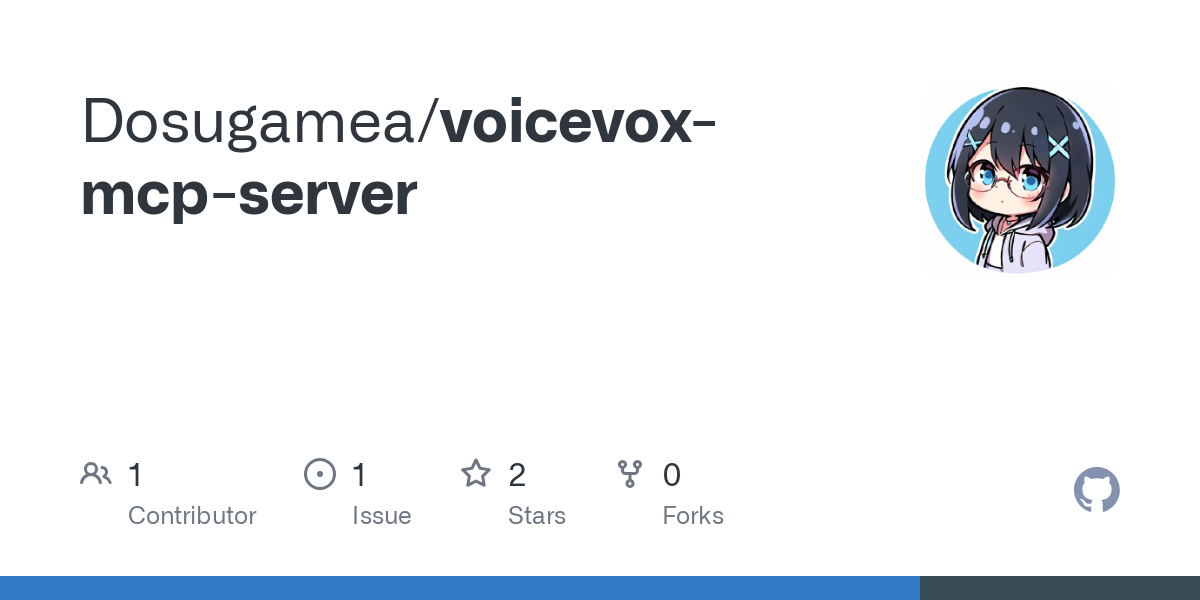dosugamea_voicevox_mcp_server
by DosugameaVoicevox MCP Server for AI Voice Synthesis
The Voicevox MCP Server is a server that enables the use of VOICEVOX-compatible voice synthesis engines (such as AivisSpeech, VOICEVOX, and COEIROINK) via the Model Context Protocol (MCP). It is designed to facilitate voice synthesis in agent mode using Claude 3.7, particularly in tools like Cursor.
Overview
This server allows seamless integration of VOICEVOX voice synthesis capabilities into applications that utilize the MCP. It is particularly useful for developers working on AI-driven voice synthesis projects.
Prerequisites
Windows Environment
- Node.js 18 or higher
- VOICEVOX ENGINE (running locally at
http://localhost:50000) - VLC Media Player (must be accessible via PATH)
Docker Environment (WSL2)
- Docker and Docker Compose
- WSL2
- VOICEVOX ENGINE (running locally or in Docker)
- Linux environment with
libsdl2-dev,pulseaudio-utils, andpulseaudioinstalled - Access to
/mnt/wslg
Installation and Setup
-
Clone the repository:
bash git clone https://github.com/Dosugamea/voicevox-mcp-server.git cd voicevox-mcp-server -
Install dependencies:
bash npm install -
Configure environment variables by copying
.env_exampleto.envand modifying it as needed:
env VOICEVOX_API_URL=http://localhost:50021 VOICEVOX_SPEAKER_ID=1
Usage
Running on Windows
To start the server on Windows:
npm run build
npm start
Running on Docker
The server runs in stdio mode when using Docker, so no additional commands are needed.
Configuration
Windows Configuration
Add the following to your mcp.json file:
"voicevox": {
"url": "http://localhost:10100/sse"
}
Docker Configuration
Add the following to your mcp.json file (note: this has not been fully tested in the author's environment):
{
"tools": {
"voicevox": {
"command": "cmd",
"args": [
"/c",
"docker",
"run",
"-i",
"--rm",
"-v",
"/mnt/wslg:/mnt/wslg",
"-e",
"PULSE_SERVER",
"-e",
"SDL_AUDIODRIVER",
"-e",
"VOICEVOX_API_URL",
"-e",
"VOICEVOX_SPEAKER_ID",
"your-local-docker-image-name"
],
"env": {
"PULSE_SERVER": "unix:/mnt/wslg/PulseServer",
"SDL_AUDIODRIVER": "pulseaudio",
"VOICEVOX_API_URL": "http://host.docker.internal:50031",
"VOICEVOX_SPEAKER_ID": "919692871"
}
}
}
}
Speaker IDs
The default speaker ID is 1 (corresponding to "四国めたん"). To use a different speaker, modify the VOICEVOX_SPEAKER_ID environment variable. You can retrieve a list of available speakers using the VOICEVOX ENGINE API:
curl http://localhost:50021/speakers
Troubleshooting
- VOICEVOX Connection Errors: Ensure the VOICEVOX ENGINE is running and the API URL is correctly configured.
- No Audio Output: Verify that VLC is installed and accessible via PATH.
- Docker Audio Issues: Check your pulseaudio settings.
Developer Information
Contributions are welcome! Please create an issue or submit a pull request for any bugs or feature requests.
License
This project is licensed under the MIT License.

